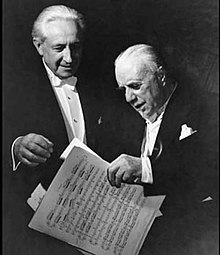Carl Ebert
In his later years Ebert held administrative posts in Los Angeles and Berlin, and was a guest director at opera houses and festivals in Europe.
[1] To keep it secret from her family that she had an illegitimate child, Mary Collins persuaded a fellow-student, Eileen Lawless, to be officially recorded as the boy's mother.
[4] From 1905 he trained for two years to be a banker, but in 1907 he gained a free place at Max Reinhardt's School of Dramatic Art in Berlin, and pursued a career in the theatre.
[5] In 1914 Ebert was called up for military service, but after a year he was released at the instigation of the Schauspielhaus, Frankfurt, which was in urgent need of a leading actor.
[10] When the Nazis came to power in 1933, Hermann Göring, in his capacity as chief minister of Prussia, offered Ebert an expanded role, with control of all the opera houses of Berlin.
[3] Ebert, politically hostile to Nazism, preferred instead to leave the country and base himself and his family in Switzerland, where he rented a home in Lugano.
He directed at the Schauspielhaus Zürich, the Maggio Musicale Fiorentino in Florence and the German opera season at the Teatro Colón in Buenos Aires.
The Times later said of Ebert: What he accomplished at Glyndebourne in collaboration with Fritz Busch as conductor was to give a living demonstration that opera was a form of art sui generis, a Gesamtkunstwerk, and not, as English tradition had for a couple of centuries believed, a vehicle for star singers against tattered scenery and rough-and-ready stage management.
When the curtain went up on Figaro at Glyndebourne in 1934 it was a revelation of the ideals of Monteverdi's dramma per musica 300 years earlier, which were more often observed in German than in Italian opera houses or at Covent Garden.
[13] At the end of the Second World War the Allied powers occupying Germany invited Ebert to undertake a thorough tour of all parts of the country and report on the state of the theatre.
In 1961 he supervised the rebuilding and directed the opening production of the company's new opera house in Berlin, the Deutsche Oper,[5] after which he retired.
[4] Ebert continued to accept invitations to work as a guest director with Glyndebourne (until 1963), Zürich and the Wexford Festival (until 1965), and Berlin (until 1967).


